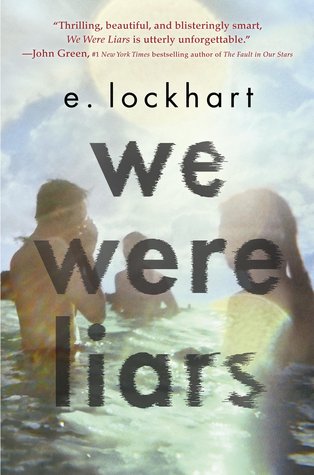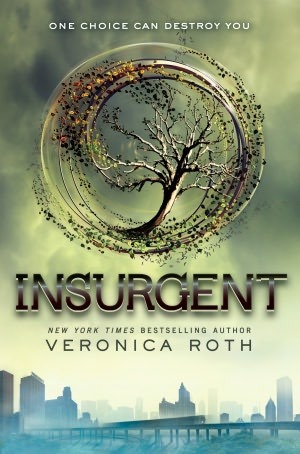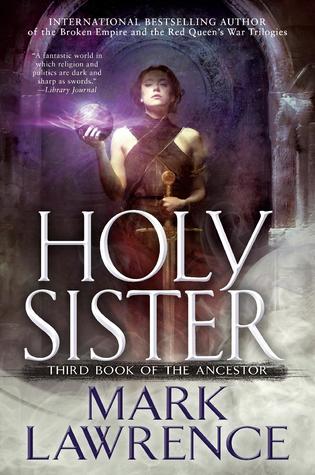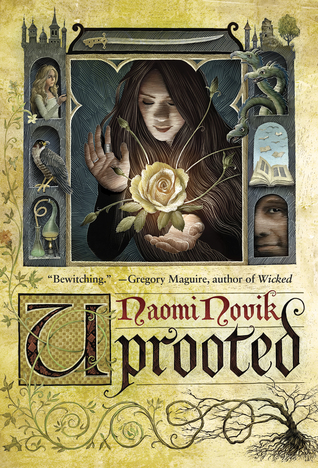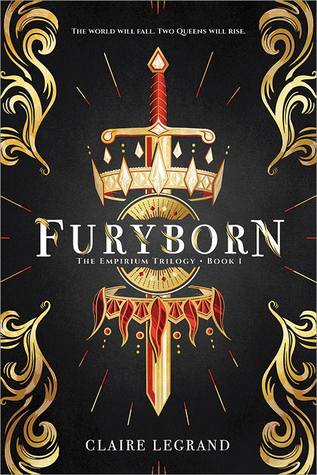
Synopsis:
When assassins ambush her best friend, Rielle Dardenne risks everything to save him, exposing herself as one of a pair of prophesied queens: a queen of light, and a queen of blood. To prove she is the Sun Queen, Rielle must endure seven elemental magic trials. If she fails, she will be executed...unless the trials kill her first.
One thousand years later, the legend of Queen Rielle is a fairy tale to Eliana Ferracora. A bounty hunter for the Undying Empire, Eliana believes herself untouchable--until her mother vanishes. To find her, Eliana joins a rebel captain and discovers that the evil at the empire's heart is more terrible than she ever imagined.
As Rielle and Eliana fight in a cosmic war that spans millennia, their stories intersect, and the shocking connections between them ultimately determine the fate of their world--and of each other.
Rating: 🌟🌟🌟🌟
4.5 stars. Oh my goodness, I flipping loved this! Imagine the
addictive quality and vibe of a Sarah J. Maas book, but with queer
characters, characters of color, more cohesive world-building, and a
narrative beyond romance, and you get Furyborn.
Gosh, where do I even start? What drew me in with this novel initially was the SJM vibe. I used to love SJM's books, despite all their faults and problematic elements, but there has been a noticeable decline in the quality of her works in the past few years. I just can't get into her books like I used to, and I feel really disillusioned with her new works. I've been mourning it, honestly, the loss of these addicting, guilty pleasure reads. So discovering Furyborn as a comparable, but distinctly better, work was such a delight. My feelings for this book went from zero to 100 REAL QUICK.
One of my favorite parts about this book was the world-building. I can't believe I'm saying this, but in an age of YA fantasy where belief typically takes the form of a pantheon consisting of multiple gods, Furyborn's obvious inspiration from Christian mythology was really refreshing. Typically, portions of Christian myth are cherry-picked - angels as ~cool supernatural beings~ or religious Renaissance art aesthetic, for example - and slapped into a fantasy world without context. But in the world of Furyborn, there is/was a God with a capital G. And that's something I've never seen in a modern fantasy novel. Angels are ultimately the focus of this world and their existence is cohesive with the world-building, rather than just being an intriguing, powerful fantasy race. I loved that continuity.
In terms of the characters, I have mixed feelings. Both Rielle and Eliana can be intensely unlikable characters at times. There were times were I was ready to jump out of my seat and root for them, and other times their foolishness had my eyes rolling so far into the back of my head. Eliana is such a hard ass that I think she's a difficult character to write, so her characterization sometimes felt inconsistent and unbalanced in those moments of vulnerability. Rielle definitely felt more constant. But despite their flaws, I LOVED these two women. I adore heroines that aren't easy to love with my entire soul.
Plus, they're both bisexual! I know some have had some issues with the bi rep in this book, but as a bisexual woman, I absolutely loved reading about two amazing, complicated, powerful bi women. Acting like a bi women is suddenly "not bisexual enough" if she's in a relationship with or attracted to the opposite gender is frankly biphobic and if you feel that way, I strongly encourage you to rethink your attitude towards bi folks. I think critiques regarding the "promiscuous bisexual" stereotype are valid, though, even if I personally don't think this novel is enforcing that. Thanks for coming to my TED talk.
Also, Corien. That's it. That's the entire paragraph.
Okay, no, but I freaking loved Corien. 11/10 Claire Legrand did an amazing job at writing him. He's a bastard, but I haven't been so intrigued by a character since the Darkling. If you think I was Rielle every time Corien spoke to her...you so right. I enjoyed Simon a lot too, but like Rielle, I thought he suffered uneven characterization towards the end of the novel.
The pacing wasn't the best at times, but switching between queens every single chapter was such a smart strategy on Legrand's part in keeping me engaged. Almost every chapter ended on a cliffhanger. So when I was just about bursting with excitement for Rielle's journey, suddenly a new chapter would begin following Eliana. But then by the time I would get to the end of Eliana's chapter, I'd be so engrossed in her story that switching back to Rielle would be difficult. It kept me consistently excited for both Rielle's and Eliana's stories, so I never favored one storyline over the other and it made the pages fly by.
So now that we've established that MY ENTIRE BODY SANG WITH LOVE THE WHOLE TIME I READ THIS, why isn't this a 5 star read? What it comes down to is that I didn't enjoy the last 1/3 of the book as much as I did the first 2/3. Eliana's chapters felt especially meandering towards the end of the novel, and I still don't understand what Navi or Remy are contributing to the story besides convenient outlets for character development that doesn't feel organic. That, combined with Eliana and Simon's uneven characterization, made the last bit of the novel significantly less exciting for me. I have a feeling my rating will change to 5 stars on a reread, but for now, Furyborn is a 4.5 for me.
If you got this far, my advice is this: If you loved Throne of Glass, read this. If you hated Throne of Glass, read this.
Gosh, where do I even start? What drew me in with this novel initially was the SJM vibe. I used to love SJM's books, despite all their faults and problematic elements, but there has been a noticeable decline in the quality of her works in the past few years. I just can't get into her books like I used to, and I feel really disillusioned with her new works. I've been mourning it, honestly, the loss of these addicting, guilty pleasure reads. So discovering Furyborn as a comparable, but distinctly better, work was such a delight. My feelings for this book went from zero to 100 REAL QUICK.
One of my favorite parts about this book was the world-building. I can't believe I'm saying this, but in an age of YA fantasy where belief typically takes the form of a pantheon consisting of multiple gods, Furyborn's obvious inspiration from Christian mythology was really refreshing. Typically, portions of Christian myth are cherry-picked - angels as ~cool supernatural beings~ or religious Renaissance art aesthetic, for example - and slapped into a fantasy world without context. But in the world of Furyborn, there is/was a God with a capital G. And that's something I've never seen in a modern fantasy novel. Angels are ultimately the focus of this world and their existence is cohesive with the world-building, rather than just being an intriguing, powerful fantasy race. I loved that continuity.
In terms of the characters, I have mixed feelings. Both Rielle and Eliana can be intensely unlikable characters at times. There were times were I was ready to jump out of my seat and root for them, and other times their foolishness had my eyes rolling so far into the back of my head. Eliana is such a hard ass that I think she's a difficult character to write, so her characterization sometimes felt inconsistent and unbalanced in those moments of vulnerability. Rielle definitely felt more constant. But despite their flaws, I LOVED these two women. I adore heroines that aren't easy to love with my entire soul.
Plus, they're both bisexual! I know some have had some issues with the bi rep in this book, but as a bisexual woman, I absolutely loved reading about two amazing, complicated, powerful bi women. Acting like a bi women is suddenly "not bisexual enough" if she's in a relationship with or attracted to the opposite gender is frankly biphobic and if you feel that way, I strongly encourage you to rethink your attitude towards bi folks. I think critiques regarding the "promiscuous bisexual" stereotype are valid, though, even if I personally don't think this novel is enforcing that. Thanks for coming to my TED talk.
Also, Corien. That's it. That's the entire paragraph.
Okay, no, but I freaking loved Corien. 11/10 Claire Legrand did an amazing job at writing him. He's a bastard, but I haven't been so intrigued by a character since the Darkling. If you think I was Rielle every time Corien spoke to her...you so right. I enjoyed Simon a lot too, but like Rielle, I thought he suffered uneven characterization towards the end of the novel.
The pacing wasn't the best at times, but switching between queens every single chapter was such a smart strategy on Legrand's part in keeping me engaged. Almost every chapter ended on a cliffhanger. So when I was just about bursting with excitement for Rielle's journey, suddenly a new chapter would begin following Eliana. But then by the time I would get to the end of Eliana's chapter, I'd be so engrossed in her story that switching back to Rielle would be difficult. It kept me consistently excited for both Rielle's and Eliana's stories, so I never favored one storyline over the other and it made the pages fly by.
So now that we've established that MY ENTIRE BODY SANG WITH LOVE THE WHOLE TIME I READ THIS, why isn't this a 5 star read? What it comes down to is that I didn't enjoy the last 1/3 of the book as much as I did the first 2/3. Eliana's chapters felt especially meandering towards the end of the novel, and I still don't understand what Navi or Remy are contributing to the story besides convenient outlets for character development that doesn't feel organic. That, combined with Eliana and Simon's uneven characterization, made the last bit of the novel significantly less exciting for me. I have a feeling my rating will change to 5 stars on a reread, but for now, Furyborn is a 4.5 for me.
If you got this far, my advice is this: If you loved Throne of Glass, read this. If you hated Throne of Glass, read this.

